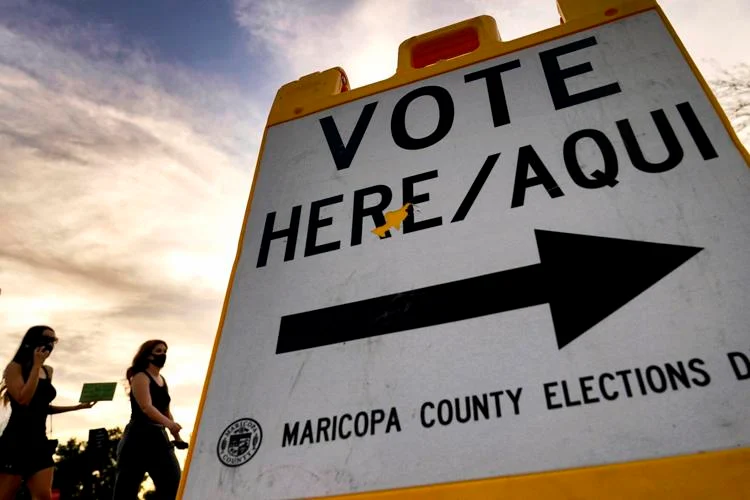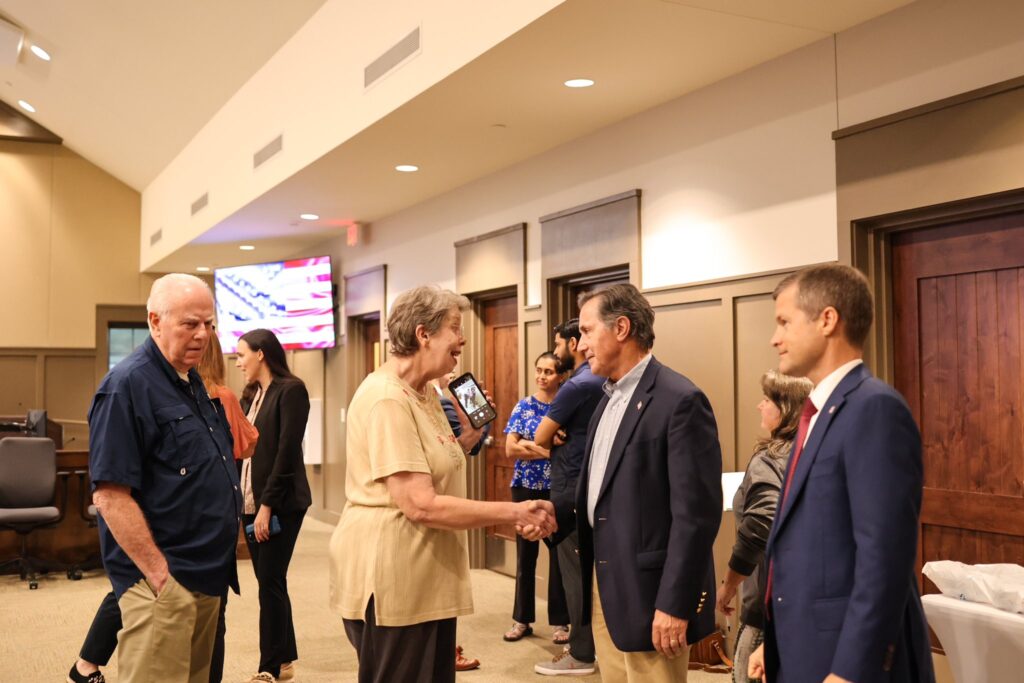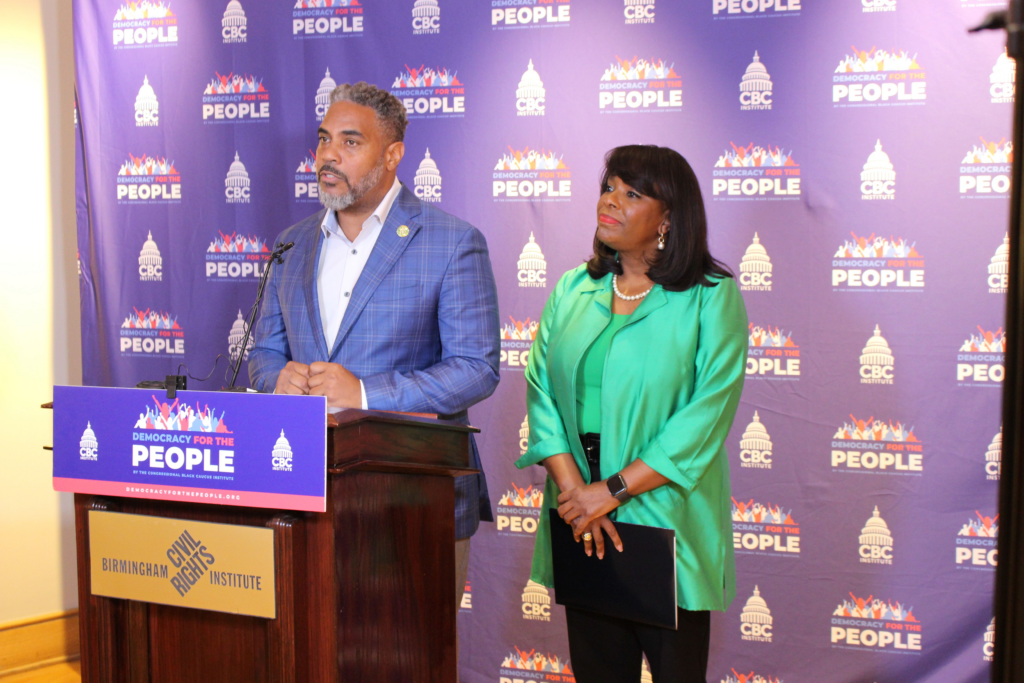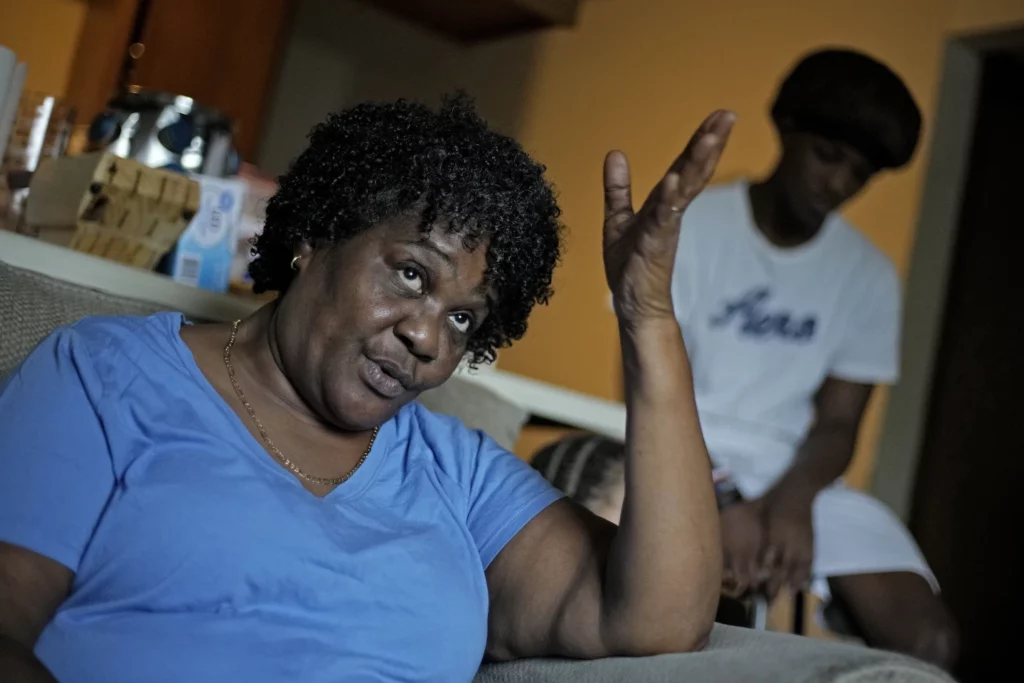Republican Executive Committee will decide presidential delegates, not GOP voters

The Republican National Convention will be in Milwaukee, Wisconsin, next year to select the Republican nominee for President. On Saturday, the Alabama Republican Party State Executive Committee passed its Presidential Preference Primary Resolution – which details how Alabama’s presidential delegates will be allocated for the 2024 Republican Presidential Primary. Much of that remains the same. The major change is that Alabama’s Republican primary voters will still pick the candidates for President of the United States but will not get to pick the delegates pledged to that candidate. In past presidential elections, there were dozens of names on the ballot for voters to select from pledged to each presidential primary candidate. The winning delegates for the candidates with enough votes to be awarded delegates would then represent Alabama at the Republican National Convention. There won’t be any delegates for voters to vote on in the 2024 Republican primary ballot. Voters can still choose which presidential candidate they prefer: Donald Trump, Mike Pence, Ron DeSantis, Nikki Haley, Vivek Ramaswamy, Tim Scott, Asa Hutchison, Chris Christie, etc. The roughly 475-member Republican State Executive will decide who the 50 delegates to the convention are. State Representative Matt Simpson (R-Daphne) introduced the resolution. “Delegates to the convention don’t just nominate the President. They also serve on the rules and platform committees,” Simpson said. “This is party business.” “The best people to make the decisions on how to grow up in the party is to reward the people that have been in the party,” Simpson said. “We know better than anybody who are the workers, who supported the party, who are the Republicans.” “The general public really doesn’t have a clue about the people on the ballot,” Simpson said. State Auditor Andrew Sorrell, who is also the State Executive Committee’s bylaws committee chairman, said that the delegates will still have to pledge to the candidate that they represent before the primary. Alabama will have 50 delegates at the RNC Convention in Wisconsin next year. The Chairman will be one delegate, as will the National Committeeman and the National Committeeman. Those positions are presently held by John Wahl, Paul Reynolds, and Vicki Drummond. The executive committee will then select 26 statewide at-large delegates. Alabama’s seven congressional districts will have three delegates each for a total of twenty-one delegates allocated by congressional district. The 2024 Presidential Preference Primary Resolution keeps the same delegate allotments as previous cycles. Details include the following: A candidate must receive a minimum of 20% of the vote on either the statewide or congressional district level to be awarded any delegates. The 26 statewide at-large Republican delegates will be awarded to the first-place candidate if that candidate receives over 50% of the vote in the state’s Super Tuesday primary. There will be three delegates from each of the state’s seven congressional districts, for a total of 21 delegates. The congressional district delegates will also be awarded to the first-place candidate that receives over 50% of the vote in each of the congressional districts. If no candidate receives over 50% at either the statewide or the congressional district level, the delegates will be awarded proportionally based on primary election results. The state executive committee voted 72% to 28% to approve the bylaw amendment. Since the Republican primary will be on March 5, presumably after the ALGOP’s winter meeting tentatively scheduled for February, there will likely be a special meeting of the State Executive Committee in the Spring to select the delegates. Other items passed at the Saturday meeting include: A ban on campaign donations from the National Education Association (NEA) and its affiliates – including the Alabama Education Association (AEA) – for all Republican school board and superintendent candidates. A resolution condemning President Joe Biden for circumventing the Hyde Amendment and using taxpayer money to fund abortion-related expenses and supporting Senator Tommy Tuberville for standing up to the Biden Administration over its flawed policy. To connect with the author of this story or to comment, email brandonmreporter@gmail.com.
Gary Palmer holds meet-and-greet town halls

Congressman Gary Palmer (R-AL06) was back home in the district this week. Palmer, his wife, Ann, and his staff hosted meet-and-greet format town halls with constituents in Alabaster on Monday and Trussville on Wednesday. Alabama Today caught up with Palmer on Wednesday in Trussville. Despite severe weather, approximately 80 people attended the Trussville Civic Center for the congressional town hall. “I was here Friday for the Prayer Breakfast, and it is still raining,” Palmer said. “Trussville is growing. I am really excited about the direction we are going.” Trussville Mayor Buddy Choat said, “Thanks for taking the time to come out and meet with us. Welcome back to you, your wife, and staff.” Palmer told the residents that construction would resume again on the long-delayed Northern Beltline. “It won’t be I-459 – I think it will be I-422,” Palmer said. “I think it will make a big difference.” “In just eight years, Birmingham has gone from the number one city in Alabama to number three,” Palmer continued. “I think that is because we have not been bringing in the companies like we should have.” Palmer said that it is important to attract companies and jobs for this area rather than them going to Charlotte or Dallas, “so you don’t have to fly to Dallas to meet the grandkids.” Palmer said that he brought his D.C. staff out to meet the people of the district because “they need to meet the people that they work for: you.” “Thank you for coming,” Palmer said. “We have the Washington staff as well as the district staff. I chair the Republic Policy Committee, so I also have the Committee staff.” “Ethan Vice is my District Director, while William Smith is my Chief of Staff,” Palmer said as he introduced the various members of his staff. “These are some of the absolute best people that I have ever worked with across the board. I am blessed to work with them.” Palmer said that if a constituent has a question about a veteran’s benefits issue, he has a staff person there who specializes in that and a staff person who specializes in IRS issues. Palmer made reference to the growing passport delay situation. Palmer said he has staff that specializes in passport issues. “We get about fifty of those calls a day.” The renewing, issuing, and replacing lost or stolen passports has become a major issue. The State Department is months behind on the work. If you are planning on international travel within the next ten to twelve months, apply for a passport or passport renewal as soon as possible due to the bureaucratic delays and new European security rules that will not allow American visitors whose passports will expire within the next three months. State Representative Danny Garrett (R-Trussville) was also there to chat with constituents. Palmer grew up on a small farm in Hackleburg in North Alabama. He attended the University of Alabama and played football for then-head football Coach Paul “Bear” Bryant. He co-founded the Alabama Policy Institute (API) with Tom Parker, which he headed for over 25 years. In 2014, when Congressman Spencer Bachus announced his retirement, Palmer entered the crowded Republican field to replace Bachus. Palmer and then State Representative Paul DeMarco advanced to the Republican primary runoff, where Palmer prevailed. Palmer advanced in the Republican leadership under then Speaker of the House Paul Ryan (R-Ohio) to head of the Republican Policy Committee. Palmer recently announced that he is seeking a sixth term representing Alabama’s Sixth Congressional District. CD-06 presently includes all or parts of Shelby, Jefferson, Blount, Bibb, and Chilton Counties. In the map that the Legislature passed three weeks ago, the district would lose Blount County but would pick up parts of Autauga and part of Elmore counties. That map, like the previous map, is currently being challenged in federal court by civil rights activists. The ongoing legal saga means that there is currently a great deal of uncertainty about what those congressional districts will actually look like in next year’s election. The major party primaries will be on March 5. To connect with the author of this story or to comment, email brandonmreporter@gmail.com.
Special counsel got a search warrant for Twitter to turn over info on Donald Trump’s account, documents say

Special counsel Jack Smith’s team obtained a search warrant in January for records related to former President Donald Trump’s Twitter account, and a judge levied a $350,000 fine on the company for missing the deadline to comply, according to court documents released Wednesday. The new details were included in a ruling from the federal appeals court in Washington over a legal battle surrounding the warrant that has played out under seal for months. The court rejected Twitter’s claim that it should not have been held in contempt or sanctioned. Smith’s team repeatedly mentioned Trump’s tweets in an indictment unsealed last week that charges the former president with conspiring to subvert the will of voters and cling to power after he lost the 2020 election to Democrat Joe Biden. Trump, a Republican, has pleaded not guilty to charges including conspiracy to defraud the United States and obstruction of Congress’ certification of Biden’s win. He posted on his Truth Social platform on Wednesday that the Justice Department “secretly attacked” his Twitter account, and he characterized the investigation as an attempt to “infringe” on his bid to reclaim the White House in 2024. It’s unclear what information Smith may have sought from Trump’s account. Possibilities include data about when and where the posts were written, their engagement, and the identities of other accounts that reposted Trump’s content. The search warrant underscores the breadth of the investigation and the lengths Smith has gone to obtain evidence to build his case. In a recent signal that Smith’s investigation is continuing, former New York Police Commissioner Bernie Kerik met Monday with investigators from special counsel Smith’s team. Prosecutors obtained the search warrant on Jan. 17 directing Twitter to produce information on Trump’s account after a court “found probable cause to search the account for evidence of criminal offenses,” according to the ruling. The government also obtained a nondisclosure agreement that had prohibited Twitter from disclosing the search warrant, the filing says. The court found that disclosing the warrant could risk that Trump could jeopardize the ongoing investigation by giving him “an opportunity to destroy evidence, change patterns of behavior” or notify his allies, the filing says. Twitter objected to the nondisclosure agreement, saying four days after the compliance deadline that it would not produce any of the account information, according to the ruling. The judges wrote that Twitter “did not question the validity of the search warrant” but argued that the nondisclosure agreement violated its First Amendment right to communicate with Trump. Twitter said if it had to turn over the records before the judge assessed the legality of the nondisclosure agreement, it would prevent Trump “from asserting executive privilege to shield communications made using his Twitter account,” the document says. The warrant ordered Twitter to provide the records by Jan. 27. A judge found Twitter to be in contempt after a court hearing on Feb. 7, but gave the company an opportunity to hand over the documents by 5 p.m. that evening. Twitter, however, only turned over some records that day. It didn’t fully comply with the order until Feb. 9, the ruling says. X, the platform formerly known as Twitter, sent an automated reply to a request for comment, saying it would respond soon. In the broader case against Trump, his legal team has indicated it will argue that he was relying on the advice of lawyers in 2020 and had the right to challenge an election he believed was rigged. Trump used his Twitter account in the weeks leading up to his supporters’ attack on the Capitol on Jan. 6, 2021, to spread false statements about the election that prosecutors allege were designed to sow mistrust in the democratic process. The indictment details how Trump, over Twitter, encouraged his followers to come to Washington on Jan. 6, pressured his Vice President Mike Pence to reject the certification, and falsely suggested that the mob at the Capitol — which beat police officers and smashed windows — was peaceful. The warrant arrived at Twitter amid rapid changes instituted by Elon Musk, who purchased the platform last year. Since taking over, he’s transformed the influential site, laying off much of its staff, including workers dedicated to ferreting out misinformation and hate speech. He also eliminated Twitter’s policy on COVID-19 misinformation and welcomed back a long list of users who had been previously banned, including neo-Nazis, COVID deniers, and Trump, who was kicked off after the attack on the Capitol for glorifying violence. Trump has yet to post to the site since being allowed back on. As Trump once did, Musk has used the platform as a partisan megaphone. Last year Musk urged his many online followers to vote Republican in the midterm elections. This year he hosted Republican presidential candidate Ron DeSantis for a glitch-filled campaign kickoff. The election conspiracy case is the second case Smith has brought against Trump. The former president is also facing dozens of felony counts stemming from classified documents found at his Mar-a-Lago estate. Trump’s legal team, in court papers Wednesday, urged the judge to allow for the reestablishment of a secure facility at Trump’s home where the former president can discuss classified evidence with his attorneys while they prepare for trial in that case. Prosecutors say Trump should only be to do so at sensitive compartmented information facilities — or SCIFs. But Trump’s lawyers say “immense practical and logistical hurdles and costs” would make traveling to government-approved locations difficult. He wants to recreate the same secure facility at Mar-a-Lago in which he was allowed to discuss classified materials as president. Republished with the permission of The Associated Press.
Rep. Terri Sewell, Chairman Steven Horsford, and Congressional Black Caucus issue statement on Amicus Brief objecting to Alabama Congressional Map

Last week, Congresswoman Terri Sewell (D-AL07), Congressional Black Caucus (CBC) Chairman Steven Horsford (NV-04), and members of the Congressional Black Caucus commented on their amicus brief filed by the CBC in the Northern District of Alabama. The CBC is upset that the Alabama Legislature failed to submit a new congressional map with two majority Black districts in July’s special session, so they have filed the amicus brief supporting Milligan and the other parties challenging the state’s congressional redistricting. “In defiance of the U.S. Supreme Court’s ruling in Allen v. Milligan, the Republican-controlled Alabama State Legislature has yet to redraw its congressional district map to include a second majority Black district—falling far beneath the goal set by the highest court in the land,” the CBC members said in a statement. “Instead of creating a second district where Black voters would have an opportunity to elect a Black-preferred candidate in compliance with the U.S. Supreme Court ruling, the Alabama State Legislature chose to again put forth a map that robs Black voters of their fundamental rights at the ballot box.” “Therefore, the Congressional Black Caucus filed an amicus brief in the United States District Court in the Northern District of Alabama objecting to the newly enacted congressional district map because we will not stand by and allow improper, racially discriminatory maps to stand without challenge,” the CBC Congressmembers concluded. Horsford came to Birmingham on Friday for a Congressional Black Caucus Institute (CBCI) event, the same day that former President Donald Trump came to Alabama. The CBCI hosted a mobilizer training session to educate participants on effective community mobilization, grassroots efforts, and impactful communication techniques to drive social change. Following the training, Sewell and Horsford hosted a panel discussion with Miles College President Bobbie Knight, Lawson State Community College President Cynthia Anthony, Interim Special Assistant to the President for Strategic Planning and Initiatives at Alabama A&M University Jackie Robinson, III, Community Activist Dee Reed, and Birmingham Urban League President and CEO William Barnes. The conversation was moderated by journalist Roland Martin and focused on pressing issues of democracy and racial equity, including attacks on Black history, the erosion of affirmative action, the state of voting rights, and the critical role of HBCUs in shaping our path forward. The Congressional Black Caucus claims that having only one majority Black district in Alabama – where 27% of the voting population is Black – violates the Voting Rights Act of 1965. The three-judge panel in Atlanta will hear both party’s cases later this month. It is likely that whichever side loses at the Eleventh Court of Appeals will ask the U.S. Supreme Court to intervene in the case. Many national pundits and legal scholars have to this point, questioned the Republican-controlled State Legislature’s congressional map. To connect with the author of this story or to comment, email brandonmreporter@gmail.com.
Riverfront brawl brings unwelcome attention to Montgomery

Three white boaters in Alabama’s capital city will be charged with misdemeanor assault for a riverfront brawl with a Black boat captain that drew nationwide attention, with more charges likely to come, police said. Videos of the incident, which circulated widely on social media, have proven crucial in investigating what happened, Montgomery Police Chief Darryl Albert said. One person has turned himself in, and the other two have agreed to turn themselves in by the end of the day Tuesday. “The investigation is ongoing, and more charges are likely,” Albert said. The fight was largely split along racial lines and began when a moored pontoon boat blocked the Harriott II riverboat from docking in its designated space along the city’s riverfront, Albert said. The Harriott II had 227 passengers aboard for a tour. The viral video of white boaters assaulting a Black riverboat captain and the following melee brought unwelcome attention to the historic city — which is known across the country for the Montgomery bus boycott in the 1950s and voting rights marches in the 1960s. The city, in recent decades, has tried to move beyond its reputation as a site of racial tension and to build a tourism trade instead based on its critical role in the Civil Rights Movement. “I don’t think you can judge any community by any one incident. This is not indicative of who we are,” Mayor Steven Reed said Tuesday. He noted that the people on the pontoon boat were not from Montgomery. “It’s important for us to address this as an isolated incident, one that was avoidable and one that was brought on by individuals who chose the wrong path of action,” Reed said. Before the fight began, the riverboat captain tried to contact the pontoon boat owner by loudspeaker. People on the other boat responded with “obscene gestures, curse words, and taunting,” the police chief said. The riverboat co-captain took another vessel to shore to attempt to move the pontoon boat and “was attacked by several members of the private boat.” Albert said several people from the riverboat came to the co-captain’s defense, “engaging in what we all have seen since on social media.” Video captured by bystanders showed that once the Harriott II docked, several people from the riverboat rushed to confront the people on the pontoon boat, and more fighting broke out. The video showed people being shoved, punched and kicked, and one man hitting someone with a chair. At least one person was knocked into the water. “The co-captain was doing his job. He was simply trying to move the boat just enough so the cruise ship could park safely, but it quickly escalated,” Albert said. The police chief said so far, the charges are against people from the pontoon boat who assaulted the co-captain and a 16-year-old who got involved. Police are trying to locate and question the man with the chair. The fight took place along Montgomery’s downtown riverfront in an area where slaveowners once unloaded people from steamboats to be sold at auction. Now, the city has developed the area into a tourist and recreation place with restaurants, bars, and hotels. The Harriott II takes tourists on sightseeing trips with food and entertainment, along the Alabama River. The brawl sparked dozens of internet memes and videos, with some joking that the chair should be placed in a local museum. Albert said while some made racial taunts, the police department does not believe the motivation behind the fight rises to the standard of a hate crime. Alcohol is believed to be an escalating factor, he said. Christa Owen of Clanton was aboard the riverboat with her husband and their daughter for a dinner cruise to celebrate the daughter’s 12th birthday. She said the riverboat captain said on loudspeaker: “Black pontoon boat, move your boat,” and that passengers also yelled for the boat to move so they could dock. “They shrugged their shoulders,” Owen said. She said the crew member, identified by police as the co-captain of the riverboat, got off to move the pontoon boat a few feet. Owen said the tension was obvious and mounting before punches were thrown. She said passengers felt helpless as they watched the co-captain get pummeled by several people on shore. Owen, a stay-at-home mom, filmed the confrontation as it began on the dock. She said as a “mother of many,” she knows the importance of being able to document how a conflict started. Once the boat was able to dock, she said her family had to figure out how to get off the boat safely with the fighting going on around them. “It didn’t have to escalate to that,” she said. Republished with the permission of The Associated Press.
Millions struggle to pay AC bills in heat waves. Federal aid reaches only a fraction

Bobbie Boyd is in a losing battle against near triple-digit temperatures in northwest Arkansas. Her window air conditioner runs nonstop, and the ballooning electric bill carves about $240 out of her $882-a-month fixed income. So the 57-year-old cuts other necessities. Boyd eats one meal a day so her 15-year-old grandson, who she’s raising alone, can have two. She stopped paying car insurance and skips medical appointments. “The rent and the light bill. And I’m broke,” said Boyd, who needs the cooling to stave off her heat-induced asthma attacks. As climate change ratchets up temperatures across the U.S., millions of the poorest Americans grapple with the same agonizing decisions as Boyd — between perilous indoor heat or paying costly bills. While President Joe Biden has invested billions into federal programs that subsidize the poorest Americans’ energy costs, the money reaches only a fraction of the most vulnerable during the sweltering summer months. Nationwide, nearly 30 million American households struggle to pay their energy bills and qualify for the subsidy, but less than 3% receive it for their summer bills, according to the latest, preliminary federal data. Compared to food stamps, which reach over 80% of the eligible population nationwide, the Low Income Home Energy Assistance Program, or LIHEAP, falls far short even as climate change helped make July Earth’s hottest month on record and air conditioning becomes a means of survival. That’s because most states run out of their federal funding every year, according to the Department of Health and Human Services, which oversees the program. “We’re likely to see the energy-insecure population grow unless we have some pretty significant and substantial government intervention,” said Michelle Graff, who studies the federal subsidy at Cleveland State University. As it stands, many states don’t even offer assistance for summer months, and those that do often run out of funds before the hottest days roll around. The program was founded decades ago with a focus on winter heating bills and has been slow to adapt to climate change’s hotter summers. Biden has promoted LIHEAP as “crucial for low-income families to help with their energy bills,” saying last week that during the sweltering summer, “even when the heat is over, many of our families may see their largest-ever energy bill.” On a visit Tuesday, Biden told a crowd north of Phoenix — where residents endured 31 straight days above 110 degrees in which at least 18 people died indoors without air conditioning — that “extreme heat is America’s No. 1 weather-related killer.” Still, in Arizona, the nation’s hottest state, where roughly 650,000 low-income households qualify for the federal energy help for cooling assistance, only about 11,600 actually received it, according to the federal data. Samira Burns, a Health and Human Services official, said in a statement that the Biden administration doubled the LIHEAP budget through the American Rescue Plan and that HHS has updated guidance to help states target support during extreme heat. “The Biden-Harris Administration has prioritized ensuring that eligible households seek and receive the utility assistance they need,” she said. “We know we must continue to do all that we can.” Just outside Phoenix five years ago, the death of 72-year-old Stephanie Pullman on a sweltering day after her electricity was cut off because of a $51 unpaid bill brought attention to the danger heat poses to people who are energy insecure. While Arizona power companies are now banned from cutting off customers during the hottest months, last year nearly 3 million people had their power disconnected for failing to pay bills — a third within the three hottest summer months, according to data collected by the Energy Justice Lab. “In the more extreme, but not at all rare circumstance, the risk is death,” said Sanya Carley, who studies energy policy at the University of Pennsylvania and is co-director of the Energy Justice Lab. When Candace Griffin of Houston, Texas, received disconnection notices this summer, she scrambled to keep the electricity flowing by seeking nonprofit assistance to pay monthly bills that surpassed $400. There wasn’t anywhere else to pull extra money from. “I have to pay the energy bill, I have to have lights, I have to have AC,” the 51-year-old said. And, “I have to eat.” The poorest Americans and minority communities already live in hotter neighborhoods, and many suffer without air conditioning at all. While there are tax credits and rebates to help install air conditioning, most remain out of reach for impoverished households. But even with air conditioning, those with the lowest incomes face higher costs than their wealthier counterparts — in part because they are more likely to live in older, less insulated, and drafty homes. Energy-insecure households paid 20 cents more per square foot for energy usage than the national average, according to the U.S. Energy Information Administration. The federal Weatherization Assistance Program helps shore up low-income homes to make them better insulated, less leaky and reduce reliance on air conditioning and heating altogether. Still, while almost 40 million low-income households are eligible, only about 35,000 households get the help each year, according to the U.S. Department of Energy. “It’s because, just, lack of funds,” said Bruce Tonn, who studies the program at a Tennessee research nonprofit. Biden has since infused billions into the program, investments he touted Tuesday. The program is critical because it reduces energy bills, which tip roughly a quarter of low-income households into debt, according to Carley of the Energy Justice Lab. And, if electricity is disconnected, costs just add up. The fridge warms, and the food goes bad; utility companies charge hefty reconnection fees. “It becomes very, very difficult for them to dig out and to be able to … pay their next energy bill,” said Carley, who added that about half of households who are disconnected have been disconnected before. National nonprofits, including the Salvation Army and Catholic Charities, offer emergency financial aid, which thousands rely upon, especially since LIHEAP requires a multi-step application every year. Vivian Romero, who is raising two teenage granddaughters outside Phoenix,
Trendco to build $43 million facility in Tuskegee, creating 292 jobs

A medical equipment manufacturing company plans to invest $43 million in a plant in Alabama to produce nitrile medical gloves, Gov. Kay Ivey said Wednesday. Trendco USA, based in Columbia, South Carolina, has committed to creating 292 new jobs over the next five years at the facility in Tuskegee in the new Regional East Alabama Logistics Park off Interstate 85 in Macon County, she said. “After considering many locations in other states, Trendco decided to locate its manufacturing facility in Tuskegee, and I am confident the company made the right choice for its investment project,” Ivey said. Trendco produces medical-grade examination gloves in Louisiana through a partnership with another company and plans to install as many as 10 glove production lines at the Tuskegee location. Eventually, production will include masks and gowns. The company will lease more than 100,000 square feet of space at the industrial park, where it will set up a distribution operation as it prepares to launch glove production. “We believe the people of Tuskegee and the surrounding communities will play a vital role in our success in the medical technology sector,” said CEO Darryl Hunter. Alabama Commerce Secretary Greg Canfield said the project, and the park, will “capitalize on the growth of the I-85 corridor, and I believe other companies will be putting down roots there in the near future.” The Macon County Commission, Macon County Economic Development Authority, and other local institutions are supporting the project with utility upgrades and an industrial access road at the site worth $1.1 million, and other in-kind services. AIDT, the state’s primary workforce development agency, is also providing services. Republished with the permission of The Associated Press.


